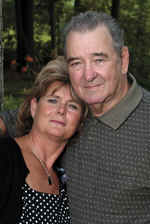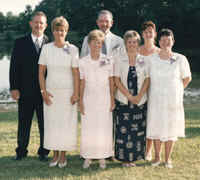|
Coping
With A Long Goodbye
by Bill
Sherrod, Managing Editor
|

Cindy
Adams and her father, Charlie Brock, savor memories of the wife
and mother they lost.
|
Dementia�s
slow erosion of self devastates families.
Researching
available resources early on is an important step towards preparing for the
inevitable.
Nancy
Reagan said it best. It really is a long, long goodbye.
That�s
how Mrs. Reagan described the 10 years she lived with husband Ronald
Reagan�s Alzheimer�s disease.
And
that�s how Cindy Adams sums up the loss of her mother, Sharon Rose Thomas
Brock, to Pick�s disease, a regressive, fatal form of dementia similar to
Alzheimer�s.
Cindy�s
mother passed away June 8, 2005, more than eight years after the family
first noticed her lapses in memory and behavioral oddities.
It
was a devastating loss for the family, a family that had been the focal
point of Sharon Brock�s life: husband Charlie, four daughters, a son, 11
grandchildren and two great-grandchildren. Especially
later in her life, before she got sick, family was central to her being,
according to her daughter Cindy. �Family was everything to mother. She was
always there for us.�
More
than Stress
�My
father had a contracting business, and mother ran the office for him,�
says Cindy, who is the advertising manager for Cooperative Living magazine.
�We first noticed a lapse in her communication skills. She would leave out
words in phone conversations with us. Then, we noticed she began forgetting
things at work: She�d give my father the wrong address for a job, or
misplace a check.�
For
almost two years, Sharon�s family attributed the shifts in her behavior to
having �too many things on her plate�; in general, life stress.
|

Sharon
and Charlie Brock (center) with their children Tony Brock, Cindy
Adams, Elaine Ramsey, Sandra Byiers and Karen Pollard. |
�The
doctor said it was stress, but it seemed to get worse as time wore on,�
says Cindy. �Then, she started getting lost. She went to visit her mother
and couldn�t find her way back home. When she told us that had happened,
we knew it was more than stress or just having too much on her mind.�
At
that point, Cindy�s sister Elaine took Sharon to a neurological
specialist, who initiated a series of tests that, after several anxious
months, ended in October 1999 with the heartbreaking diagnosis of Pick�s
disease.
�The
doctor told us that Pick�s disease involves a rapid deterioration of the
frontal lobe of the brain,� says Cindy. �He also told us about the
symptoms and the probable progression of the disease, and that we should
start taking steps immediately to take her driver�s license and get power
of attorney for her.�
Thus
began the long, sad trip that ended in Sharon�s death, a tragic eight-year
journey of compounding loss. In the second year after her diagnosis, Sharon
became depressed and began to withdraw from interaction with her family and
friends. �We saw major changes in her personality,� says Cindy. �This
was one of the hardest things to get used to, seeing mother change from an
extrovert to an introvert.�
Yet,
as the effects of the disease worsened, Cindy saw emerge the strength of her
father�s commitment to his wife. �You don�t realize how special your
parents� love for each other is until you are face-to-face with the
realization that some horrible disease is stealing the life right out of one
of them,� observes Cindy. �Our father amazed us with his compassion and
strength, with his day-to-day caring for mother. Some of the things I
remember most was the way she would ask the same question over and over, or
keep pushing him to take her for a ride when he had just gotten back from
driving her around, sometimes for hours.�
Over
the course of time, Sharon lost her ability to express herself in normal,
adult ways. Eventually, she lost the ability to speak coherently. But as
this happened, she became increasingly childlike in her desire to touch, hug
and hold onto her family, especially her children and grandchildren.
�She
connected to us, her family, in a very basic way right up to the end,�
says Cindy. �I could tell by the light in her eyes when I would greet her.
Even though she couldn�t express herself verbally, she would light up.�
The
last six months of Sharon�s terrible journey were the darkest, Cindy
continues. �In February 2005, mother took a turn for the worse. She became
violent with my father, stopped taking her medicine, and sometimes would try
to bite us. All of this was behavior we�d never seen in my mother.� Near
the end, Sharon lost even the ability to eat and tend to her most basic
human needs and functions.
�We
tried all the medications for dementia, with no appreciable effect.� Cindy
notes. �I really felt like we began to lose her when they put her on
haldol and then morphine. Still, through all the trips to the doctor�s
office and the hospital, she�d grab my hand and hold onto it.�
When
Sharon died on June 8, 2005, it was devastating for her family. Cindy says
there�s no easy way to take the loss of a loved one, even when it comes at
the end of so terrible a journey as the eight-year trip her family had just
made.
Prepare
in Advance
�The
most important thing for any caregiver is to seek out the resources that are
available, and do it as soon as you can. Don�t wait until you�re so
caught up in providing the care that you can�t spare the time to research
the possibilities. And don�t put all your faith in one doctor�s plan of
treatment � it�s always good to get a second opinion.� Cindy says.
�The
Alzheimer�s Association is a good starting point,� she adds. �They
will send you information about facilities, home nurses and other services.
Also, they have a hotline that was very helpful when I became distraught.
�Find
out if there are adult day-care facilities near you that can provide respite
care. Get medical power of attorney. Hospice can work with you for years,
too,� she adds. �At the end of your loved one�s life, you want to be
able to spend as much time as you can with them, rather than running around
trying to find out what resources are available,� Cindy says. �Don�t
be afraid to ask for help, and don�t be afraid to seek outside help.
Explore the resources. Find out what professional help is out there, and
don�t be afraid to accept it.�
In
looking back at this long, sad, eight-year journey, Cindy says, �From the
beginning of my mother�s illness, I knew I�d lose her. I didn�t know
when or how it would happen, but from the beginning I knew that I missed her
already.�
For
More Information:
 |
National
Institute of Neurological Disorders and Stroke: www.ninds.nih.gov/disorders/picks/picks.htm |
 |
Alzheimer�s
Association: www.alz.org, (1-800-272-3900) |
 |
Hospice
of Virginia: www.hospiceva.com.
|
|